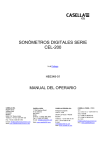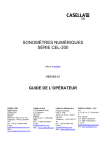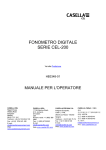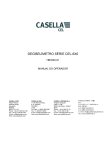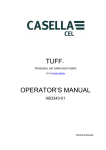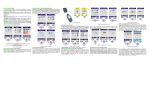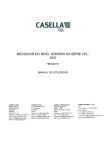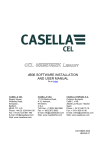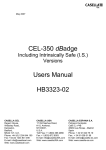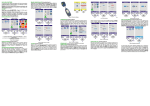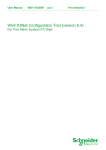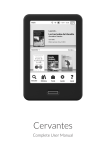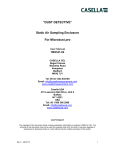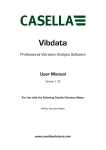Download CEL-200 SERIES DIGITAL SOUND LEVEL METERS
Transcript
CEL-200 SERIES DIGITAL SOUND LEVEL METERS Go to Preface HB3348-01 OPERATOR’S MANUAL CASELLA CEL Regent House Wolsley Road Kempston Bedford MK42 7JY, U.K. Phone: +44 (0) 1234 844 100 Fax: +44 (0) 1234 841 490 E-mail: [email protected] Web: www.casellameasurement.com CASELLA USA 17 Old Nashua Road, # 15, Amherst NH 03031 USA Toll Free: +1 (800) 366 2966 Fax: +1 (603) 672 8053 E-mail: [email protected] Web: www.casella USA.com CASELLA ESPANA S.A. Polígono Európolis Calle C, nº4B 28230 Las Rozas - Madrid Spain Phone: + 34 91 640 75 19 Fax: + 34 91 636 01 96 E-mail: online@ casella-es.com Web: www.casella-es.com CASELLA CHINA(中国) 地址 北京东城区东方广场W1座911室 邮编: 100738 电话: 0086 10 85183141 传真: 0086 10 85183143 电子邮件: [email protected] 网址: www.casellachina.cn PREFACE Back to Cover 1. MANUAL CONVENTIONS This section of the manual details the priority of Warnings, Cautions and Notes that may apply throughout this manual. 2. INTRODUCTION This section of the manual gives a brief overview of the equipment. PREPARATION FOR USE 3. This section of the manual describes the first steps to using the CEL-200 Series Digital Sound Level Meter. 4. GENERAL OPERATION This section of the manual describes the basic operating procedures. CALIBRATION 5. This section of the manual details the Calibration method. 6. INSTRUMENT SETTINGS This section of the manual describes the how to use the Instrument Settings. 7. CONFIGURATION MENU This section of the manual describes how to make changes to three specific settings. TIME AND DATE (CEL-242/246 ONLY) 8. This screen displays the time and date. 9. MEMORY DELETION (CEL-242/246 ONLY) This section details how to delete all loggings from the instrument memory. 10. SET TIME AND DATE (CEL-242/246 ONLY) This section details how to set the time and date. 11. SWITCH OFF This section of the manual describes the shut down procedure. 12. EQUIPMENT SPECIFICATION This section of the manual gives the Specifications and Characteristics for the CEL200 Series Digital Sound Level Meter. 13. SERVICE AND WARRANTY This section of the manual explains Casella’s after sales policy on the instruments covered in this manual. 14. ENVIRONMENTAL CONSIDERATIONS This section of the manual stipulates the environmental policies Casella have committed to for the manufacture of instruments. 15. DECLARATION OF CONFORMITY This section shows the declaration of conformity for the CEL-200 series instrument. 2 1. MANUAL CONVENTIONS PRIORITY ONE PERSONAL SAFETY. When a WARNING is included in the text, the WARNING will always precede the text it applies to. WARNING: Indicates personal injury will result if proper precautions are not followed. PRIORITY TWO EQUIPMENT PROTECTION. A CAUTION will always precede the text it applies to. CAUTION: Indicates equipment damage can result, if proper precautions are not taken. Note(s). Notes usually follow the text to which they apply. Notes can contain advice, hints, extra information and explanations. Back to Index 3 2. INTRODUCTION CEL-240, 242, 244 and CEL-246 Congratulations on your purchase of a CEL-200 Series Digital Sound Level Meter, subsequently referred to as the ‘instrument’. The instrument has been designed to perform accurate noise measurements through a wide range. It is a completely digital sound level meter, designed for stable, reliable performance, fully compliant with international sound level meter standards. This instruction manual is to help you get the most benefit from your CEL-200 Series Digital Sound Level Meter and to ensure accurate noise measurements. The CEL-200 Series range comprises of 4 models, the features are summarised in the table below. The instrument is illustrated in Figure 1. 4 Figure 1 CEL-200 Series Digital Sound Level Meter 1. Microphone. 2. Power ON / OFF key. 3. Display. 4. Left Key. 5. Right Key. 6. USB PC Output. 7. Auxiliary socket (2.5mm Stereo). Back to Index 5 3. PREPARATION FOR USE PROCEDURE (Refer to Figure 2) 1. Open the Battery Cover. 2. Check the battery compartment is clean and dry. 3. Fit three new AA Alkaline (or NiMH) batteries according to the polarity in the battery compartment. 4. Close the Battery Cover. Notes: If there is evidence of leakage from previously installed batteries, contact Casella at the address given in Contact Details before using the instrument. Caution: Do not mix battery types. Always fit new batteries when the battery indicator (A) shows battery strength is low to prevent the instrument switching OFF while in use. Figure 2 Preparations for Use Back to Index 6 4. GENERAL OPERATION 1. Press and release the Power ON/OFF key to switch ON. During the software initiation the screen will display the firmware version (e.g. V035-05 indicates issue 5 of the firmware) and the serial number (such as 0108121) followed by the Main Measurement screen. (Refer to Figure 3). Note: During power-up, CEL-242 and CEL-246 models will display time/date and memory settings as described in Section 8. If you do not wish to alter these settings on CEL-242/246 models do not press any keys and the instrument will proceed to the main measurement shown below. 2. If the instrument requires calibration, refer to CALIBRATION for details. 3. Fit the windshield over the microphone before attempting any measurement. CEL-240/242 CEL-244/246 A. – Battery Indicator. B. – Over Range Indicator. C. – Sound Pressure Level. D. Analogue Display Bar. E. Measurement Scale. F. Maximum Sound Pressure Level. G. Instrument Settings. H. Reset. I. Average Sound Pressure Level. Figure 3 Main Measurement Screen 7 4. A Bargraph (Refer to Figure 4 [A]) or Time History (Refer to Figure 4 [B]) will be displayed. Refer to INSTRUMENT SETTINGS to change the Time and Frequency Weightings, or to change the type of display. CEL-240/242 CEL-244/246 Figure 4 CEL-200 Series Bargraph and Time History Screens 5. The screen will display the instantaneous and maximum sound pressure levels along with the relevant Time and Frequency Weighting. Refer to Instrument Settings to change these settings. Additionally, CEL-244 and CEL-246 instruments will display the average level (Leq or Lavg) since the reset button was pressed. To reset the maximum sound pressure level and average level, key. press and release the 6. When the required measurements have been taken, press and hold the Power ON/OFF key (Refer to Switch Off) for three seconds to switch the instrument OFF. Note: The ‘press and hold for three seconds’ feature prevents the CEL-200 Series being accidentally switched OFF during use. Back to Index 5. CALIBRATION It is recommended that an acoustic calibration using a CEL-110/2 (or CEL-110/1) calibrator be performed before and after taking measurements. PROCEDURE 1. Switch ON the Acoustic Calibrator (Refer to the Calibrator Instruction Manual). 2. Check the Acoustic Calibrator has a 114dB (or 94dB) output. 3. Make sure the instrument is set to the 60-130dB range. 4. Fit the Acoustic Calibrator firmly over the microphone. The instrument automatically detects a 1kHz tone from a 94 or 114dB Calibrator and enters Calibration Mode (Refer to Figure 5). 8 Figure 5 Calibration Mode Screen to perform a calibration, or press the right key (B) to 5. Press left key (A) Exit. When calibration is complete, the Calibration Complete screen will be displayed (Refer to Figure 6). Figure 6 Calibration Complete Screen Back to Index 6. INSTRUMENT SETTINGS 1. The Instrument Settings can be changed from the Measurement screen (Refer to Figure 7). 2. Press and release the Left key (A). An Arrow (X) will be displayed beside the Settings key indicating the Settings Menu has been enabled. Note that the reset symbol will be replaced by the relevant settings to be changed as described below. 3. Press and release the Left key (A) repeatedly to cycle through the Settings screens. Note that the screens displayed will be dependent on which CEL-200 series model purchased. 9 4. Press Right key (B) to make changes to each setting as described below in sections A - G. Figure 7 Instrument Settings 5. Current settings will be saved when the instrument is switched OFF. Note that if no keys are pressed for approximately 5 seconds the CEL-200 Series will exit the settings screen and return to the normal measurement screen. This will be evident as the arrow (X) will not be beside the spanner symbol. A. RECORDING DATA (CEL-242/246 ONLY) On the CEL-242 and CEL-246 models the option to record (store) data to the memory is available. This is the first option available when the settings key is pressed. The symbol REC will be shown and when Right key (B) is pressed data will be stored in the memory. The CEL-242 will store 1 second sound pressure levels and the CEL-246 will store levels at a selectable logging interval as described in section G below. The symbol will then change to display the current run number e.g. 3 shows it is run number 3. Pressing the (B) button again will stop the run and store the results to memory. A maximum of 100 runs can be stored before memory is full and dB24 software must be used to view the stored measurements. If the memory is full this settings option will not appear. Please refer to MEMORY AND TIME/DATE SETTINGS. B. DISPLAY TYPE The Main Display can be toggled between Bargraph and Time History (Refer to Figure 4 (A) and (B) respectively) by pressing the (B) key. TIME HISTORY – This setting displays how the maximum sound pressure has varied over the last 1 minute or 5 minutes. e. BARGRAPH – The Bargraph well as the sound pressure levels. displays an analogue bar graph as To toggle between these three options press and release the Right key (B). 10 C. MEASUREMENT RANGE (30 – 100dB or 60 – 130dB) Care should be taken to select the correct measurement range depending on the noise climate being measured. Make sure the noise being measured is within the range selected. If the Over Range indicator ( ) is displayed the incorrect range has been selected. (Refer to Figure 7 [C]). If the noise level is lower than the selected measurement range ‘--.-dB’ will be displayed. D. TIME WEIGHTINGS FAST - Use this setting for comparatively stable noise. SLOW - Use this setting for noise with a slow variation. IMP (Impulse) - Use this setting for noise with rapid variation and impulsive noise. Note: If unsure please refer to your local legislation and application standards. E. FREQUENCY WEIGHTINGS Frequency weightings are used to represent the human ears response to noise. A WEIGHTING - Make this selection for general noise measurements. C WEIGHTING - Make this selection for very high noise levels. Note: If unsure please refer to your local legislation and application standards. F. AVERAGE SETTING (CEL-244/246 ONLY) The parameter to measure average noise can be set to Leq or Lavg. This is dependent on local legislation which sets the exchange rate (Q) to either 3 or 5 respectively. The Q value determines the increase in dB associated with the doubling of risk to hearing damage. Q=3 means that the increase in hearing damage risk doubles every 3dB increase in noise, respectively Q=5 means that risk to hearing damage doubles every 5dB increase in noise level. Use Leq (Q=3) for EU based workplace noise regulations and Lavg (Q=5) for US/OSHA based noise legislation. Note: If unsure please refer to your local legislation and application standards. G. LOGGING INTERVAL SCREEN (CEL-246 ONLY) In Figure 8 (C), the currently selected logging interval is displayed and is also shown above the Right key (B). Press the Right key (B) to change the logging interval. Press Left key (A) to exit the settings menu and return to the measurement screen. 11 Figure 8 Logging Interval Screen – CEL-246 only Back to Index 12 7. CONFIGURATION MENU The Configuration Menu (Refer to Figure 9) is used to make changes to the Display Contrast, Calibration Level and the Signal Input Source. To access the Configuration Menu press and hold the Right key when switching the instrument on (by pressing the Power ON key). DISPLAY CONTRAST – [Figure 9 Reference X]. Press Right key (B) to adjust the Contrast. When the contrast is considered ideal press Left key (A) to accept the changes and progress to the Calibration Level screen. SIGNAL INPUT SOURCE – [Figure 9 Reference Y]. Note: This option is for the use of acoustic laboratories only. This screen allows the Signal Input to be routed from the inbuilt microphone, or from an external signal connected via the auxiliary 2.5mm headphone socket. Press Right key (B) to toggle between microphone input and alternating current input. The default Power-Up selection is Microphone Input. Press the Left key (A) to confirm any changes. CALIBRATION LEVEL – [Figure 9 Reference Z]. This screen is used to set the nominal output level of the acoustic calibrator e.g. 114.0dB. Press Right key (B) to adjust the calibration level. Refer to the calibration certificate for the acoustic calibrator for the calibrator output level. Press Left key (A) to accept the changes and progress to the main measurement screen. Figure 9 Configuration Menu Back to Index 13 8. MEMORY AND TIME/DATE SETTINGS (CEL-242/246) This screen only appears when the instrument is switched on and only on CEL-242 or CEL-246 models. Figure 10 Time and Date Screen The memory status in Figure 10 (C) displays 100%, meaning the memory is full. No more data can be stored. To delete the memory press the Left key (A) to access the Memory Deletion Screen (Refer to MEMORY DELETION SCREEN). Ensure any measurements are downloaded via dB24 prior to deletion. Figure 10 (D) shows the time and date currently set within the instrument. Press the Right key (B) to access the Set Time and Date screen (Refer to SET TIME AND DATE SCREEN). Note: If no changes are require to the memory or time/date settings then do not press any keys and the instrument will proceed to the measurement screen. Back to Index 14 9. MEMORY DELETION SCREEN (CEL-242/246) This screen is accessed from the Time and Date screen described above. Initially press the Right key (B) if the intention is to delete the data in the memory. Then press the Left key (A) to confirm deletion as shown below in Figure 11. When the data in memory has been deleted the screen will show 0% and return to the Time and Date screen automatically. Press the Right key (B) and return to the Time and Date screen if it is decided not to delete the data in memory. Note: Ensure and saved results are downloaded via dB24 before deleting the memory. Figure 11 Memory Discharge Screen Back to Index 15 10. SET TIME AND DATE SCREEN CEL-242/246 This screen is accessed from the Time and Date screen described above. When this screen is accessed (Refer to Figure 13) the HH (hours) will be highlighted. Press Right key (B) to set the hour. Press Left key (A) to advance to the MM (minutes). Press Right key (B) to set the minutes. Press Left key (A) to advance to the SS (seconds). Press Right key (B) to set the seconds. Use keys (A and B) in the same sequence to set the date. When the time and date have been set press Left key (A) to return to the Time and Date screen. Figure 13 Set Time and Date Back to Index 11. SWITCH OFF When the required measurements have been taken, press and hold the Power Key, refer to Figure 14 (A) for three seconds to switch OFF the instrument. A ‘door’ display will be shown counting down 3, 2, 1. Figure 14 Switch OFF Back to Index 16 12. EQUIPMENT SPECIFICATION SPECIFICATION CHARACTERISTICS STANDARDS IEC 61672-1 2002-5 (Electro-Acoustics – Sound Level Meters) Group ‘X’ instruments, Performance Class 2. IEC 60651: 1979 Type 2 .ANSI S1.4 type 2A Specification for Sound Level Meters. CEL-244/246 Models: IEC 60804: 2000 Type 2, ANSI S1.43: 1997 (R2007) Type 2 RANGE: Display range: 30 -130dB(A) RMS, available in 2 ranges, 30 -100dB and 60 -130dB. Linear operating range 10dB above noise floor. RMS FREQUENCY WEIGHTINGS A and C filter weightings, satisfying IEC 61672-1: 2002 Class 2, ANSI S1.4 Type 2A. NOISE F LOOR Total noise floor typically <33dB(A). FREQUENCY RESPONSE Overall frequency response as per IEC 61672-1: 2002 Class 2, ANSI S1.4 Type 2A. TIME WEIGHTINGS Fast, Slow and Impulsive according to IEC 61672-1: 2002, ANSI S1.4 Type 2A. REFERENCE CONDITIONS o 20 C air temperature, 65% relative humidity, 101.325kPa atmospheric pressure. Nominal reference level = 114.0dB at 1kHz. Free field perpendicular incidence. OPERATING ENVIRONMENTAL CONDITIONS Humidity 5 to 90% RH in the absence of condensation. Temperature Range 0 – 40oC. Pressure 65 to 108kPa. Effects of Humidity Less than ±0.5dB over the range 30 to 90% relative humidity (non-condensing), relative to the value at reference conditions. STORAGE ENVIRONMENTAL CONDITIONS Humidity 0 to 90% RH in the absence of condensation. Temperature Range o -20 to +60 C. Pressure 65 to 108kPa. MICROPHONE Internal electret capsule 10mV/Pa nom +/-3dB within ½” preamplifier. CALIBRATION Auto calibration by application of 1kHz @ 114 or 94dB calibrator (CEL-110/2 or CEL-110/1). ±1dB calibration range. POWER SUPPLY External DC 5VDC (via US B 5 pin mini B). Batteries 3x AA, Rechargeable NiMH or Alkaline cells. 17 Battery Life Typically 35 hours. Power Consumption ~65mA. ELECTROMAGNETIC COM PATIBILITY Instrumentation is designed and tested to comply with the following EMC and ESD Standards: IEC 61000-4-2 Testing and Measuring Techniques - Electrostatic discharge immunity tests. IEC 61000-4-3 Electrom agnetic compatibility (EMC) - Radiated electromagnetic field tests. IEC 61000-4-6 Electrom agnetic compatibility (EMC) - Immunity to conducted disturbances induced by radio frequency fields. Tested at 10V/m or greater. EFFECTS OF AC POWER FREQUENCY FIELDS Less than ±0.5dB change in 74dB(A) 925Hz reference level when subjected to 80A/m AC magnetic field at 50 and 60Hz. DISPLAY Resolution 128x128 Mono Graphics LCD. Update Rate 0.5 seconds update rate. CONNECTIVITY USB USB 2.0 via ‘mini B’ socket. For SPL output (software required) weighted as per selected frequency and time weightings. AUX Socket (2.5mm stereo) AC output provided for DAT tape / PC wav file recording or headphone applications. Approx 0.5V RMS Full Scale Deflection (FSD) ‘A’ weighted output on selected range. Minimum load impedance 22kΩ. (Optional DC Output via internal configuration, 0 to 3.3V DC for FSD on selected range. Output corresponds to selected weighting, 2kΩ Output impedance). AC input used for electrical calibration, switched on via configuration menu. DATA STORAGE (CEL-242 & CEL-246 Models only) Memory Size 419,000 Data Points. Number of Measurements 100. Maximum Data Points Per Measurement 65,515. File Storage Format .CSV file compatible with MS Excel. Parameters Stored CEL-242: 1s sound pressure levels. CEL-246: 1-10s average value, either Leq or Lavg dependent on settings. Back to Index 18 13. SERVICE AND WARRANTY The manufacturer undertakes to rectify any defect in the instrument directly attributable to faulty design or assembly and which becomes apparent during the warranty period. In order to take advantage of this warranty, the instrument must be returned, carriage paid, to the manufacturer’s factory or accredited agent, where necessary repairs will be carried out. The warranty period runs for 24 months from the date of receipt of goods, with exceptions on certain specialised components supplied by other manufacturers that may be warranted for shorter or longer periods by their actual manufacturers. In all such cases, the benefit of these undertakings will be passed on to the user. CASELLA CEL’s liability is limited to items of their own manufacture, and they do not accept liability for any loss resulting from the operation or interpretation of the results from this equipment. To obtain repair under warranty, the instrument should be packed and returned in it’s original packing or an equivalent either to CASELLA CEL’s local agent, or in the case of U.K. domestic sales, to the CASELLA CEL Service Department at Bedford., UK. Please include the following information: Instrument Type(s), Serial Number(s) and Firmware Version Number(s), Customer name and address, Contact name and phone number, details of any PC and Software involved, including Version Number(s), reason for returning the equipment with a detailed description of the fault and a list of any error messages that m ay have been displayed. Back to Index 19 14. ENVIRONMENTAL CONSIDERATIONS WEEE DIRECTIVE The WEEE directive aims to raise the level of recycling of electrical and electronic equipment (EEE) and encourages designers to create products with recycling in mind. Potentially, a key part of this directive is to make all parties aware and more responsible for collection, treatment and recovery of WEEE. CASELLA MEASUREMENT AND WEEE All Casella products shipped from 13th August 2005 and thereafter will be marked in accordance with the European standard EN 50419:2005 to indicate “new EEE waste”. “Historical EEE waste” sold before this date will be handled according to national legislation in European countries. RoHS LEGISLATION The RoHS is a directive from the European Union (EU) and bans the use of certain substances used in the making of certain electrical and electronic equipment after July 2006. There are six major substances on the list; lead, cadmium, mercury, polybrominated biphenyls (PBB's), polybrominated diphenyl ethers (PBDE's), and hexavalent chromium (Cr (VI)). This directive stems from the impact these substances have to humans and the environment from both extraction of raw materials and their eventual disposal as well as occupational exposure and exposure following disposal. In Europe, over 90% of electrical/electronic equipment goes into landfill sites which amounts to about 6 million tons of waste every year. Removal of these substances will reduce both health risks and damage to the environment. CASELLA MEASUREMENT AND RoHS Products manufactured by Casella are classified under Category 9, “Monitoring and control instruments” as per Annex IA of the WEEE directive and as such are exempt from the requirements of RoHS. As an ‘environmental’ company, Casella is committed to minimising the full life cycle impact of its products and actions on the environment. Although Casella products are exempt, we are committed to working towards the directive and as such are actively involved in a program to work towards our core product ranges being fully compliant to the demands of the RoHS directive by 2010. If the scope of the directive changes during this period we will revise our strategy to ensure full compliance with the directive at all times. Back to Index 20 15. DECLARATION OF CONFORMITY Back to Index END 21






















